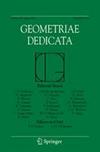有限生成群的分解复杂性增长
IF 0.5
4区 数学
Q3 MATHEMATICS
引用次数: 0
摘要
有限分解复杂性和渐近维数增长是格罗莫夫(M. Gromov)渐近维数的两个概括,可用来证明无限渐近维数的有限生成群大类的性质 A。在本文中,我们引入了分解复杂度增长的概念,它是对有限分解复杂度和维度增长的准等效不变式概括。我们证明了亚指数分解复杂性增长意味着性质 A,并通过某些群和度量构造得以保留。本文章由计算机程序翻译,如有差异,请以英文原文为准。
Decomposition complexity growth of finitely generated groups
Finite decomposition complexity and asymptotic dimension growth are two generalizations of M. Gromov’s asymptotic dimension which can be used to prove property A for large classes of finitely generated groups of infinite asymptotic dimension. In this paper, we introduce the notion of decomposition complexity growth, which is a quasi-isometry invariant generalizing both finite decomposition complexity and dimension growth. We show that subexponential decomposition complexity growth implies property A, and is preserved by certain group and metric constructions.
求助全文
通过发布文献求助,成功后即可免费获取论文全文。
去求助
来源期刊

Geometriae Dedicata
数学-数学
CiteScore
0.90
自引率
0.00%
发文量
78
审稿时长
4-8 weeks
期刊介绍:
Geometriae Dedicata concentrates on geometry and its relationship to topology, group theory and the theory of dynamical systems.
Geometriae Dedicata aims to be a vehicle for excellent publications in geometry and related areas. Features of the journal will include:
A fast turn-around time for articles.
Special issues centered on specific topics.
All submitted papers should include some explanation of the context of the main results.
Geometriae Dedicata was founded in 1972 on the initiative of Hans Freudenthal in Utrecht, the Netherlands, who viewed geometry as a method rather than as a field. The present Board of Editors tries to continue in this spirit. The steady growth of the journal since its foundation is witness to the validity of the founder''s vision and to the success of the Editors'' mission.
 求助内容:
求助内容: 应助结果提醒方式:
应助结果提醒方式:


